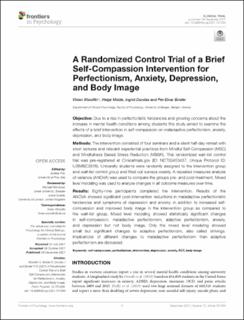A Randomized Control Trial of a Brief Self-Compassion Intervention for Perfectionism, Anxiety, Depression, and Body Image
Journal article, Peer reviewed
Published version

View/
Date
2021Metadata
Show full item recordCollections
- Department of Clinical Psychology [232]
- Registrations from Cristin [10237]
Abstract
Objective: Due to a rise in perfectionistic tendencies and growing concerns about the increase in mental health conditions among students this study aimed to examine the effects of a brief intervention in self-compassion on maladaptive perfectionism, anxiety, depression, and body image.
Methods: The intervention consisted of four seminars and a silent half-day retreat with short lectures and relevant experiential practices from Mindful Self-Compassion (MSC) and Mindfulness Based Stress Reduction (MBSR). This randomized wait-list control trial was pre-registered at Clinicaltrials.gov (ID: NCT03453437, Unique Protocol ID: UiBMSC2018). University students were randomly assigned to the intervention group and wait-list control group and filled out surveys weekly. A repeated measures analysis of variance (ANOVA) was used to compare the groups pre- and post-treatment. Mixed level modeling was used to analyze changes in all outcome measures over time.
Results: Eighty-nine participants completed the intervention. Results of the ANOVA showed significant post-intervention reductions in maladaptive perfectionistic tendencies and symptoms of depression and anxiety, in addition to increased self-compassion and improved body image in the intervention group as compared to the wait-list group. Mixed level modeling showed statistically significant changes in self-compassion, maladaptive perfectionism, adaptive perfectionism, anxiety, and depression but not body image. Only the mixed level modeling showed small but significant changes to adaptive perfectionism, also called strivings. Implications of different changes to maladaptive perfectionism than adaptive perfectionism are discussed.
